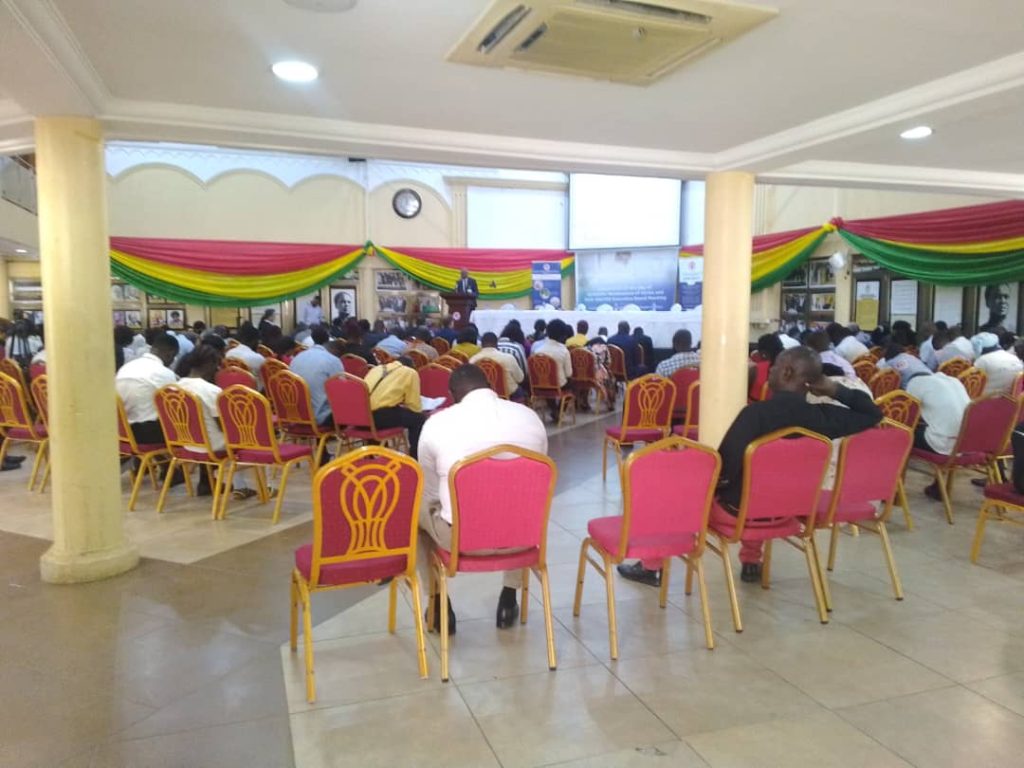By D.I. Laary
Accra, July 5, GNA – Mrs. Ophelia Hayford, Minister of Environment, Science, Technology and Innovation (MESTI), has called for sustainable funding for Ghana’s research institutions such the Council for Scientific and Industrial Research (CSIR).
She stressed the need for collaboration and networking for the country to transition away from its over-reliance on external funding and explore domestic alternatives for research and development activities.
Speaking at the celebration of the Day of Scientific Renaissance of Africa (DSRA) at the Ghana Academy of Arts and Sciences, she called on stakeholders to explore internal funding mechanisms to support research.
“It is…important for us to look within to assess our current situation and explore better ways to source for sustainable funding for our research institutions in Ghana,” she said.
“I know how far we have overly relied on external funding for research and development activities. Of course, we didn’t have a choice then because we could not generate enough resources internally to support our own research and development activities.”
She stated that science and technology played a crucial role in driving national development and noted that the 2024 DSRA theme: “Leveraging Science and Technology for Wealth Creation,” was timely and relevant, given the current global economic challenges.
She particularly lauded the CSIR and the Ghana Atomic Energy Commission for their immense contributions to national development.
She cited their works in areas such as food security, renewable energy, green economy, biodiversity, bio-medical research, and public health.
Mrs. Hayford stressed that science and technology were key drivers of economic transformation, and encouraged the country’s scientists, researchers, innovators, and technologists to step up their efforts to achieve that goal.
She also highlighted the government’s vision to mainstream science and technology in all aspects of development, with a focus on industrialization, job creation, sustainable development, tackling climate change, inter-generational equity, and improving livelihoods.
She said that stakeholders should work together to promote science and technology-led growth in Ghana and leverage their partnerships and networks to drive innovation and progress.
“We have come far as a nation and on this Day of Scientific Renaissance of Africa, let our contributions in science propel us to work together, build the right networks and partnerships, let us strive to deliver on our various mandates,” she said.

She added: “Let us continue to bring on board fresh ideas and guide the political leadership to do more for ALL, which propel the economic growth of the Country through science, technology and innovation.”
However, she told the stakeholders to exhibit professionalism and sense of duty to drive progress towards leveraging science and technology for wealth creation.
Professor Paul Bosu, Director-General of CSIR, also emphasized the critical role science and technology play in national development, highlighting the need for the country to mainstream science and technology in its educational system to bridge the economic gap among citizens.
He noted that science and technology were crucial in addressing economic challenges threatening global peace and security.
He cited a World Bank report which indicated that over 850,000 people in Ghana have been pushed into poverty due to external and internal factors.
He said it was important to utilise innovation, artificial intelligence (AI), and policy framework to facilitate the effective delivery and utilization of scientific knowledge.
“Leveraging science and technology for wealth creation will involve several strategies, including innovation and AI,” he said.
“However, inadequate policy framework to facilitate effective delivery and utilization of knowledge and the integration of science and technology into the economy is an issue that needs urgent attention.”
Professor Bosu also stressed the need for application of science and technology in areas such as biotechnology, drought management, and addressing biotic and abiotic stresses that lead to losses due to pests and diseases.
He said improved quality service delivery in health facilities through science and technology applications could contribute to a healthy population.
He called for linkages between research findings and industry, diversification of productive capacity of local industries, increasing adoption of new technologies, promoting appropriate technologies, promoting growth of SMEs, and increasing utilization of cleaner production techniques.
He noted as the world’s population is expected to hit 9.7 billion by 2050, leveraging science and technology in agriculture and other sectors would transform global food production systems and mitigate the impact on the climate and environment.
He urged policymakers to lead the way in mainstreaming science and technology in Ghana’s educational system to close the economic gap among citizens.
The DSRA was instituted by the African Union in 1987 to recognize the continent’s significant contribution to the development of modern Science and Technology.
It was launched during the 46th Ordinary Session of the Organisation of African Unity (now the African Union) held in Addis Ababa, Ethiopia, in 1987.
The initiative aims for Member States to commit to celebrating Africa’s Day of Scientific Renaissance on June 30 every year. However, since this year’s June 30th falls on a Sunday, the celebration was rescheduled to Monday, July 1st.
GNA